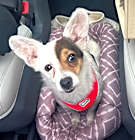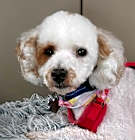Color
White
Size
(when grown) Small 25 lbs (11 kg) or less
Details
Good with kids
Good with dogs
Not good with cats
Spayed or Neutered
Shots are up-to-date
Story
You can fill out an adoption application online on our official website.Wyatt’s adoption donation is $525 and he is being fostered in Central Ohio Wyatt is fully vetted—neutered, microchipped, up to date on all his vaccines (rabies, distemper/parvo, bivalent canine influenza, Bordetella), heartworm negative, and on heartworm/flea prevention. He’s had a dental cleaning too, so he’s ready to flash that sweet poodle smile! Meet Wyatt – A Resilient, Playful Poodle with a Heart Full of Love Wyatt is a 2-year-old Miniature Poodle with a sweet soul, a goofy personality, and a heart that’s finally ready to find its forever home. He may have had a rough start as a former mill dog, but Wyatt has come a long way—both physically and emotionally—and is now blossoming into the happy, affectionate pup he was always meant to be. After coming into rescue, we discovered that Wyatt needed surgery on both of his knees. Thanks to the care and dedication of his foster family (and a lot of cozy blanket piles), Wyatt made a fantastic recovery and is now thriving. His playful spirit is shining through, and it’s been a joy to watch him transform from a timid pup into a dog who runs, plays, and loves with all his heart. Wyatt adores being outdoors- he’s your little nature enthusiast! Whether he’s sunbathing, sniffing the breeze, or simply lounging in the yard, Wyatt finds peace and happiness in the open air. He would do well as an only dog or in a home where he can play with a female fur sibling. A secure, physically fenced yard is a bonus for him but not a requirement. Wyatt absolutely loves his walks and will talk to you the entire time you are getting out his harness and lease. Wyatt needs a safe space where he can explore, zoom around, and just be his silly, happy self. Wyatt is all about the comfort—give him a cozy pile of blankets or a doggy heating pad in his bed and he’ll happily curl up and call it home. He’s crate trained and will go in willingly, and he’s doing good with potty training when kept on a regular schedule. Wyatt also does well with older kids (10+) who can give him the gentle encouragement he needs. This little guy is a gentle, goofy, and oh-so-lovable soul who’s come so far and is now ready to find a family who will celebrate all that he is. If you’re looking for a devoted sidekick, a playmate for your dog, and a pup who will remind you daily how beautiful second chances can be—Wyatt is your boy. Let Wyatt's next chapter begin with you. He’s waited long enough. Visit this organization's web site to see any additional information available about this pet.PLEASE NOTE: If you are viewing this biography on a website other than the Ohio Fuzzy Pawz website like Petfinder, Adopt-a-Pet, or another search engine (the OFP website is www.ohiofuzzypawz.com), not all information transfers to partner websites in some instances. If you go to the individual webpage of our dogs , you will be able to get more information each dog. Visual breed identification in dogs can be unreliable so, in many cases, we are only guessing at the predominant breed or breed mix. We get to know each dog as an individual and will do our best to describe each of our dogs based on personality, not by breed label. Our Adoption Process The adoption process has several steps involved. Please review prior to submitting an application. Our adoption process is detailed here: http://www.ohiofuzzypawz.com/info/adoption Our volunteers work very diligently to process each application and we try to ensure that we are making the best match possible for each dog. We do not schedule meetings with dogs until an application has been approved. It can take up to a few weeks to process an application or as little time as a few days, from the time you submit an application, please be prepared to adopt as we cannot hold dogs. Special Requirements Some dogs may have special requirements (for example, medications, a fence) -- if you apply for a dog, please be sure to read over the biography completely to see if there are any special needs and if you're home would be suitable. If we indicate on the dog's biography that a fence is required, this means your home must have a physical fence. Other dogs may require a "strong vet reference" which indicates that we are looking for a home that has a documented history of veterinary care with previous pets. The first step in our process is to submit an online adoption application at www.ohiofuzzypawz.com/forms. The application MUST include the personal references and veterinary, grooming, and landlord references (if applicable) and their respective contact information. If you do not include the references and the contact information, your application will be delayed as it CANNOT be processed. Once the references have been successfully completed, a home visit is then scheduled when a rescue representative can meet all members of the family or residents of the home. No application is approved prior to the home visit being done. At that point, the Directors will discuss any and all applications on a foster dog and make a selection--in many cases, there are multiple applications for each dog, so please be understanding that our only priority is the successful placement of each of our foster dogs. Out of State Adoptions We do adopt out of state to outstanding applicants, however, our process requires a home visit, so out of state adoptions can take longer. We do not ship our dogs, adopters should be prepared to pick up the dog in Central Ohio. May 16, 2025, 3:29 pm











